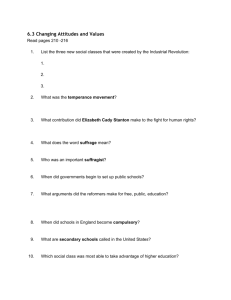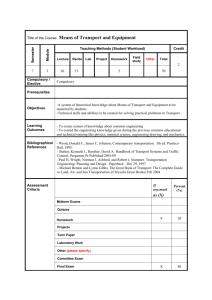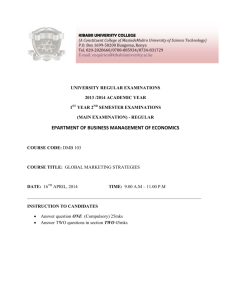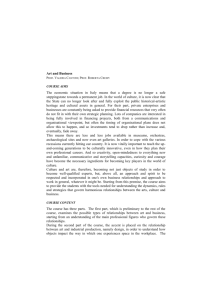Inquiry into compulsory vs. elective subjects in secondary schools
advertisement
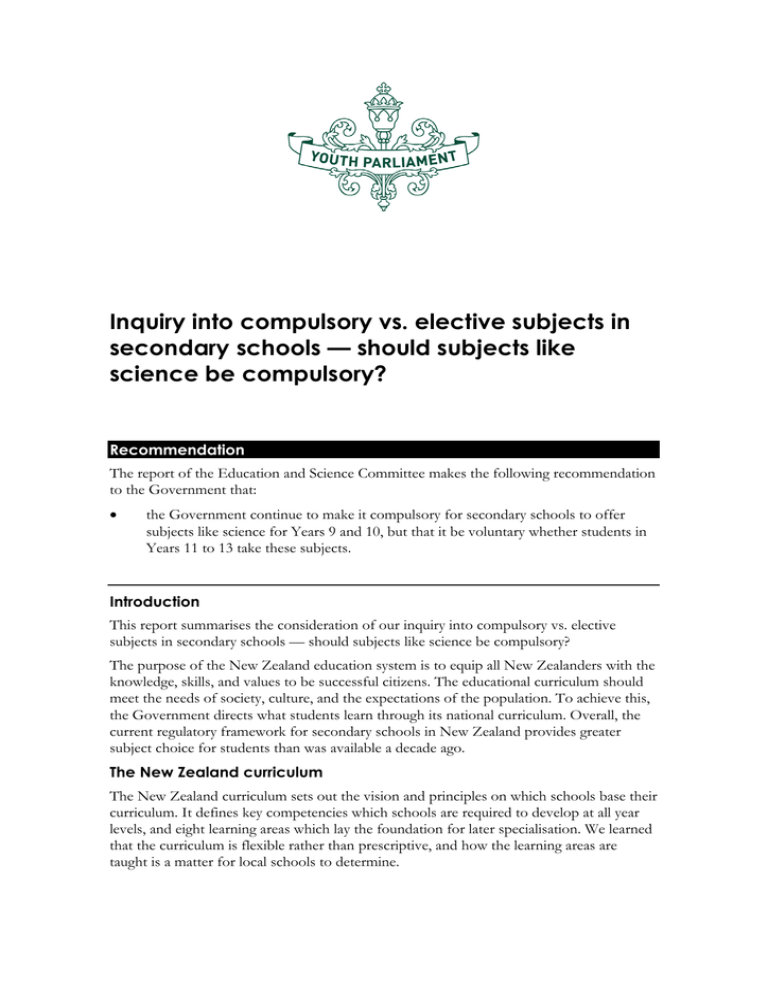
Inquiry into compulsory vs. elective subjects in secondary schools — should subjects like science be compulsory? Recommendation The report of the Education and Science Committee makes the following recommendation to the Government that: the Government continue to make it compulsory for secondary schools to offer subjects like science for Years 9 and 10, but that it be voluntary whether students in Years 11 to 13 take these subjects. Introduction This report summarises the consideration of our inquiry into compulsory vs. elective subjects in secondary schools — should subjects like science be compulsory? The purpose of the New Zealand education system is to equip all New Zealanders with the knowledge, skills, and values to be successful citizens. The educational curriculum should meet the needs of society, culture, and the expectations of the population. To achieve this, the Government directs what students learn through its national curriculum. Overall, the current regulatory framework for secondary schools in New Zealand provides greater subject choice for students than was available a decade ago. The New Zealand curriculum The New Zealand curriculum sets out the vision and principles on which schools base their curriculum. It defines key competencies which schools are required to develop at all year levels, and eight learning areas which lay the foundation for later specialisation. We learned that the curriculum is flexible rather than prescriptive, and how the learning areas are taught is a matter for local schools to determine. INQUIRY INTO COMPULSORY VS. ELECTIVE SUBJECTS IN SECONDARY SCHOOLS The National Administration Guidelines describe the administrative requirements of schools in delivering the national curriculum, which is compulsory until Year 10. Core compulsory subjects for Year 9 and 10 students include mathematics, English, science, social sciences, technology, health, and physical education. We continue to support this. Subject choice in the National Certificate of Educational Achievement In 2002 the National Certificate of Educational Achievement (NCEA) was introduced as the main national secondary school qualification (replacing School Certificate and Bursary), beginning with NCEA Level One in Year 11. NCEA allows secondary schools and students greater freedom in designing their courses of study. From Year 11 onwards, schools are free to choose which subjects are compulsory. It is common for schools to make mathematics, English, and science compulsory for Year 11 students, English only for Year 12, and no subjects compulsory in Year 13. Reform of school curricula Continually updating school curricula helps equip the next generation to contribute effectively in our rapidly changing world. In New Zealand there are concerns that school curricula may not be developing the skills and knowledge necessary to meet the challenges of the future. In particular, there is concern about a lack of financial education, that participation and performance in science and mathematics are decreasing, and that there is a need for teaching in citizenship and environmental sustainability areas. There is also discussion as to whether or not languages such as Te Reo Māori should be compulsory. Reasons for compulsory subjects Compulsory subjects exist because the learning areas are regarded as fundamental to building the key competencies of students. Other reasons for making subjects compulsory include helping direct students into work areas where there is high demand, and producing informed citizens able to engage in public debates and interpret information. International studies have shown that compulsory education in core subjects particularly improves the academic performance of students from disadvantaged backgrounds. Preferred compulsory subjects The matter of compulsion versus choice is a fundamental issue, and thinking has changed radically over time. We received information that the most popular choices for compulsory subjects today are English, mathematics, science and social studies. It was suggested that technology subjects like information and computer technology, and engineering should be encouraged to address skill shortages in the workplace. Making citizenship skills compulsory would provide the soft skills that employees need, and help develop engaged and productive citizens. It was suggested that English, maths and science should be compulsory until the end of Year 11, rather than Year 10 as currently. We do not agree with this. We agree that at Year 11 literacy and numeracy credits should be a NCEA requirement, however these credits are not restricted to being gained from the subjects of English and maths. We consider it important that students have exposure to science subjects prior to beginning secondary school so that they are able to make an informed decision at secondary level. However, we do not consider that subjects like science should be compulsory from Year 11 because we think that giving students freedom of subject choice beyond Year 10 encourages achievement. 2 INQUIRY INTO COMPULSORY VS. ELECTIVE SUBJECTS IN SECONDARY SCHOOLS Reasons for freedom of subject choice Studies have shown that students gain greater satisfaction from, and achieve better in, subjects they choose for themselves. Academic performance at university is more closely related to how well students performed at secondary school generally, rather than to the particular subjects they studied. Therefore, making more subjects compulsory may be counterproductive to improving knowledge in a specific learning area. We were interested to learn that although 75 percent of Year 11 students take science, less than 50 percent pass the subject. We would have liked to know how many of the 75 percent of students took the subject voluntarily and whether the results were affected by this. To perform well in the rapidly changing workplace, a wide range of transportable and transferable skills is desirable; well-rounded students can undertake a variety of different roles, and quickly retrain to meet new employment needs. It was suggested that a wider variety of subjects could be made accessible nation-wide through E-learning. We heard that helping students to identify career pathways is important for their future choices, and that many people can play a part in this. Resourcing teaching We were informed that providing support for teachers through professional learning and development opportunities in rural and metropolitan centres is important to retain subject specialists in the right areas. We see that a good teacher in whatever form is key to encouraging participation in subjects and promoting skill sets needed in future careers. Conclusion We are concerned that a lack of interest in subjects including science, information technology, engineering, and mathematics is resulting in a shortage of suitably skilled people in the workplace. However, we do not consider that making these subjects compulsory would necessarily solve this problem. We think that encouraging an interest in these areas from an early age by skilled teachers making the subject relevant and accessible would have more impact in determining a student’s future study and career choices. 3 INQUIRY INTO COMPULSORY VS. ELECTIVE SUBJECTS IN SECONDARY SCHOOLS Appendix Committee procedure The committee met on 16 and 17 July 2013 to consider the inquiry. The committee received seven submissions. Evidence was heard from three submitters, and advice was received from the Ministry of Social Development. Committee members Patrick Savill (Chairperson) Jake Benson Rosie Bowman Mark Davis Hanna Deal Rachel McLean-Dewes Bokyong Mun Hart Reynolds Chris Ryan Ashley Stuart Cameron Webster Madeleine Williams 4
